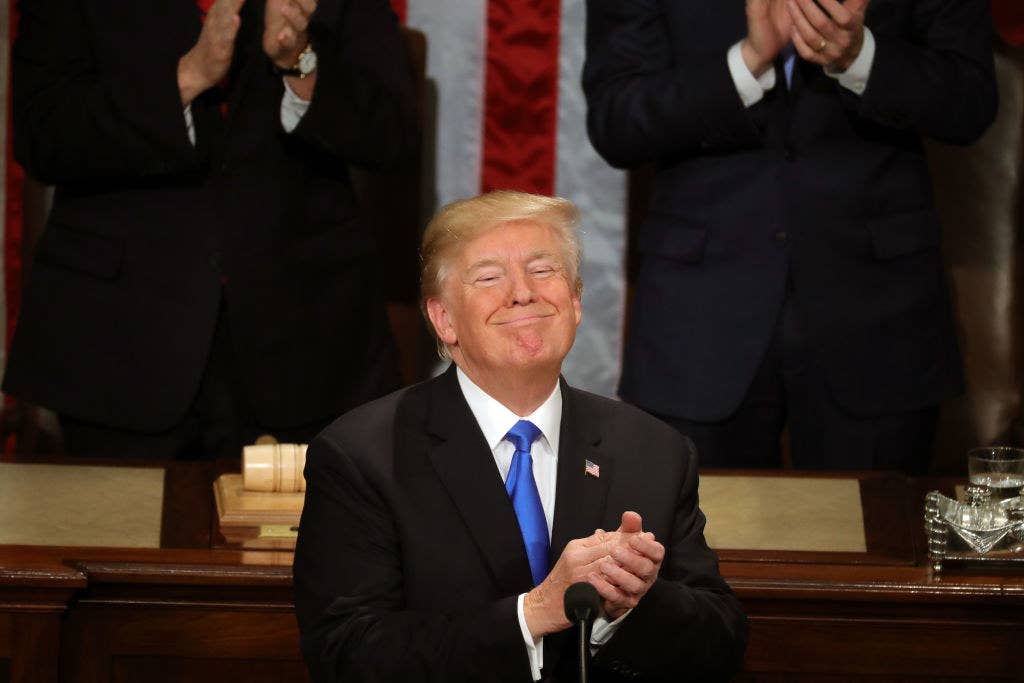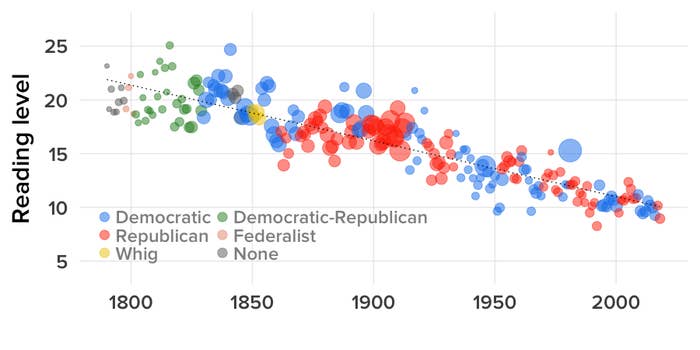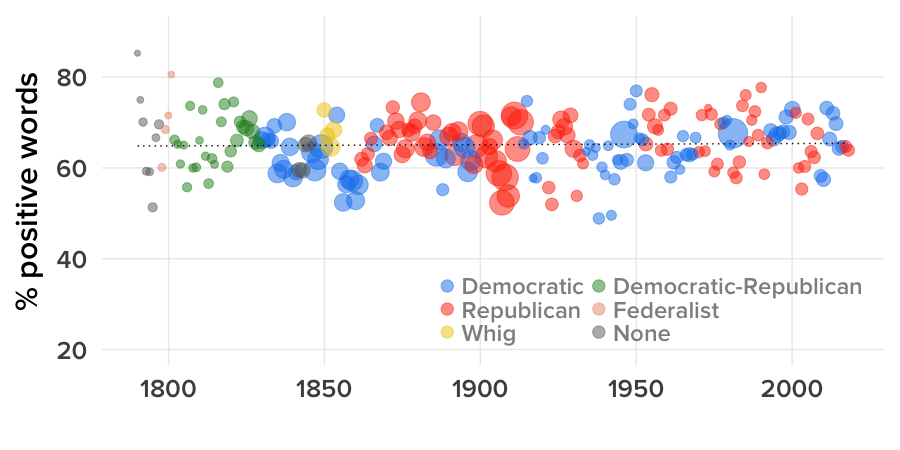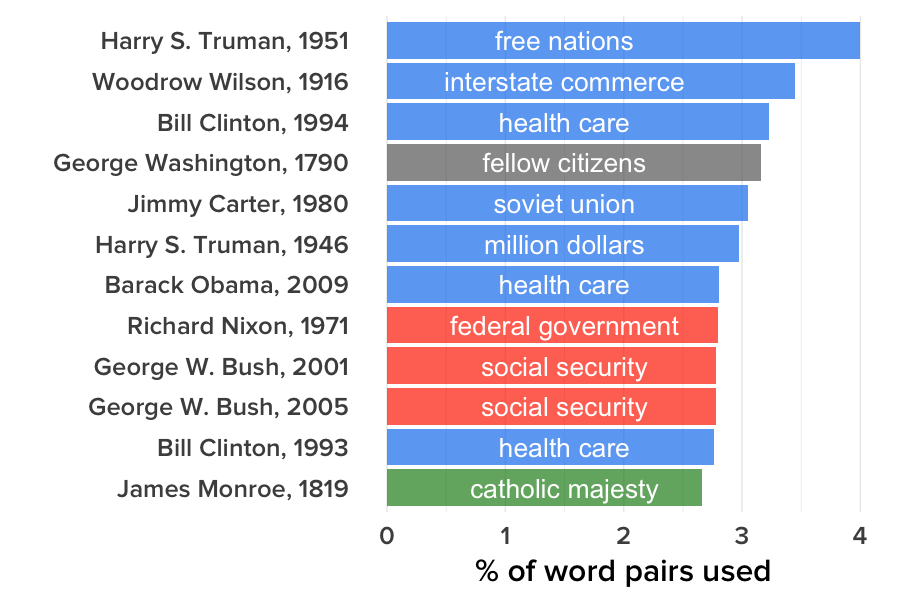
There were some words never spoken by a president on this stage before: “spine,” “revving,” and “amputations,” among others. And there was discord, when many Democrats booed the president’s comments on “chain migration.”
But in the big picture, President Donald Trump’s first State of the Union mostly followed a trajectory set by more than 200 addresses that have gone before.
BuzzFeed News analyzed every SOTU since George Washington spoke to the Congress of a new nation in 1790. They have slowly gotten easier to understand, using simpler and shorter words and sentences. Their sentiment, generally positive, has barely shifted over more than two centuries — with a few hiccups in times of national crisis.
The word pairs used most frequently in each address, meanwhile, tell a story of each president’s efforts to set the national agenda, from James Monroe pressuring the Spanish King (“Catholic Majesty”) to cede Florida in 1819, to Harry S. Truman’s call to defend “free nations” during the Korean War in 1951, to George W. Bush’s attempts to overhaul “social security” and Barack Obama’s push for “health care” reform.
Trump’s dominant word pairs last night? “American people,” “North Korea,” and “tax cuts.”
Conspicuously absent words: “Russia” and “climate.”
The Addresses Have Gotten Easier to Understand

Since 1790, the reading grade level of SOTU addresses has trended lower, as presidents have used shorter and simpler words and sentences.
In 2013, when the Guardian ran a similar analysis, it concluded: “The state of our union is … dumber.” But that’s the wrong way to think about it, according to Kathleen Hall Jamieson of the University of Pennsylvania, who studies the ways in which presidents communicate.
Although the first two presidents, George Washington and John Adams, actually spoke to Congress, over the next century the tradition was to send lawmakers a written message. That shifted with Woodrow Wilson’s spoken address in 1913. And since the advent of first radio and then TV, the president’s words have been consumed in real time, rather than committed to print and then slowly digested.
Effective communication in speech tends to mean shorter, simpler sentences than when using the written word. “That doesn’t mean the material isn’t complex,” Jamieson said. “It’s highly adapted to an oral medium.”
Weighing in at more than 33,000 words, the longest in history, Jimmy Carter wrote to Congress, rather than speaking.
The outlier in the modern era, Jimmy Carter’s 1981 address, just before he handed the keys to the Oval Office to Ronald Reagan, supports Jamieson’s view. Weighing in at more than 33,000 words, the longest in history, Carter wrote to Congress, rather than speaking, and the reading level of his text jumped up from previous SOTUs.
(That message, delivered days before before hostages in the US Embassy in Iran were released, was also notable for judging the State of the Union as merely “sound.”)
The trend to simpler speech may also reflect presidents speaking to people on their own terms, rather than talking to other members of a privileged elite. From that perspective, simple may be in fact be smart, not dumb.
And although Trump’s improvised speeches have been widely criticized as a simplistic and incoherent “word salad,” his scripted remarks last night were in line with the long-term trend of past presidents. The lowest reading level ever, in fact, was the 1992 address by George H.W. Bush.
The State of the Union Is…As Positive As It Ever Was

It’s a cliché that the State of the Union is “strong” — “because our people are strong,” as Trump put it last night.
To gain more insights into the emotional content of SOTUs over the years, BuzzFeed News looked at the overall sentiment embodied in the words used.
The most positive address ever was George Washington’s first, in 1790.
The most positive address ever, by this measure, was George Washington’s first, in 1790. The low points were Franklin D. Roosevelt’s in 1938 and 1942 — the first delivered with Europe sliding into war, the second just a month after Japan’s attack on Pearl Harbor.
Overall, though, SOTUs have struck a consistently positive tone over the years. If things have gotten better or worse since the birth of the nation, it hasn’t been reflected in the president’s annual comments.
Again, Trump’s 2018 address falls close to the long-term trend line. This is an unconventional president, whose tweets have definitely broken the political mold. But put him in front a teleprompter with prepared remarks, and he’s straight out of presidential central casting.
This Is What Presidents Have Obsessed About Over History

To understand the dominant theme in each address, BuzzFeed News looked at the most frequently used word pairs. Washington’s “fellow citizens” later gave way to specific obsessions, including Truman’s comments about “free nations,” delivered in 1951 at the height of the Korean War, and Woodrow Wilson’s frequent mentions of “interstate commerce” in 1916. That was prompted by the faltering performance of America’s railroads in the First World War, which in 1917 led Wilson to issue an order bringing the system under federal control.
More recent dominant word pairs document presidential frustrations more than successes. George W. Bush ultimately failed in his attempts to overhaul social security, as did Bill Clinton in his efforts to achieve comprehensive health care reform.
“Catholic Majesty,” mentioned repeatedly by Monroe in 1819, refers to King Ferdinand VII of Spain, who ultimately lost most of his nation’s American colonies, including Florida — which Monroe was intent on acquiring.
By comparison, Trump’s speech last night lacked a single unifying theme. His most commonly used word pairs were “American people,” “North Korea,” and “tax cuts” — but these phrases didn’t dominate his address like those shown in the chart above.
There Have Been New Words With Each Address. Here Are Some of Trump’s, In Context
Every SOTU has featured some words that have never been uttered by a president on this stage, and Trump’s speech last night was no exception. Here are some of the novel words he used, in context:
Spine
We have shared in the heights of victory and the pains of hardship. We endured floods and fires and storms. But through it all, we have seen the beauty of America's soul, and the steel in America's spine.
Legend
Some trials over the past year touched this chamber very personally. With us tonight is one of the toughest people ever to serve in this House — a guy who took a bullet, almost died, and was back to work three and a half months later: the legend from Louisiana, Congressman Steve Scalise.
Revving
In Detroit, I halted Government mandates that crippled America's great, beautiful autoworkers — so we can get the Motor City revving its engines once again.
Opioid
These reforms will also support our response to the terrible crisis of opioid and drug addiction. Never before has it been like it is now.
(Chester Arthur used the word “opium” in 1881, referring to treaties with China that banned US citizens or vessels from participating in the opium trade.)
Amputations
In 1996, Seong-ho was a starving boy in North Korea. One day, he tried to steal coal from a railroad car to barter for a few scraps of food, which were very hard to get. In the process, he passed out on the train tracks, exhausted from hunger. He woke up as a train ran over his limbs. He then endured multiple amputations without anything to dull the pain or the hurt.
See here for our full analysis of State of the Union addresses.
